Kenya
Gichugu
We find flavours of lime, grapefruit, blackcurrant
Gichugu Coffee Factory lies on the rich volcanic soils near Mt Kenya, at a relatively high 1680 meters above sea level. The factory began in the 1970s.
Coffee is picked by the farmers and brought to the factory from the nearby villages of Kamviu, Gichugu and Manyatta. As well as coffee, some of these farmers also grow crops of bananas, maize, beans, and macadamia.
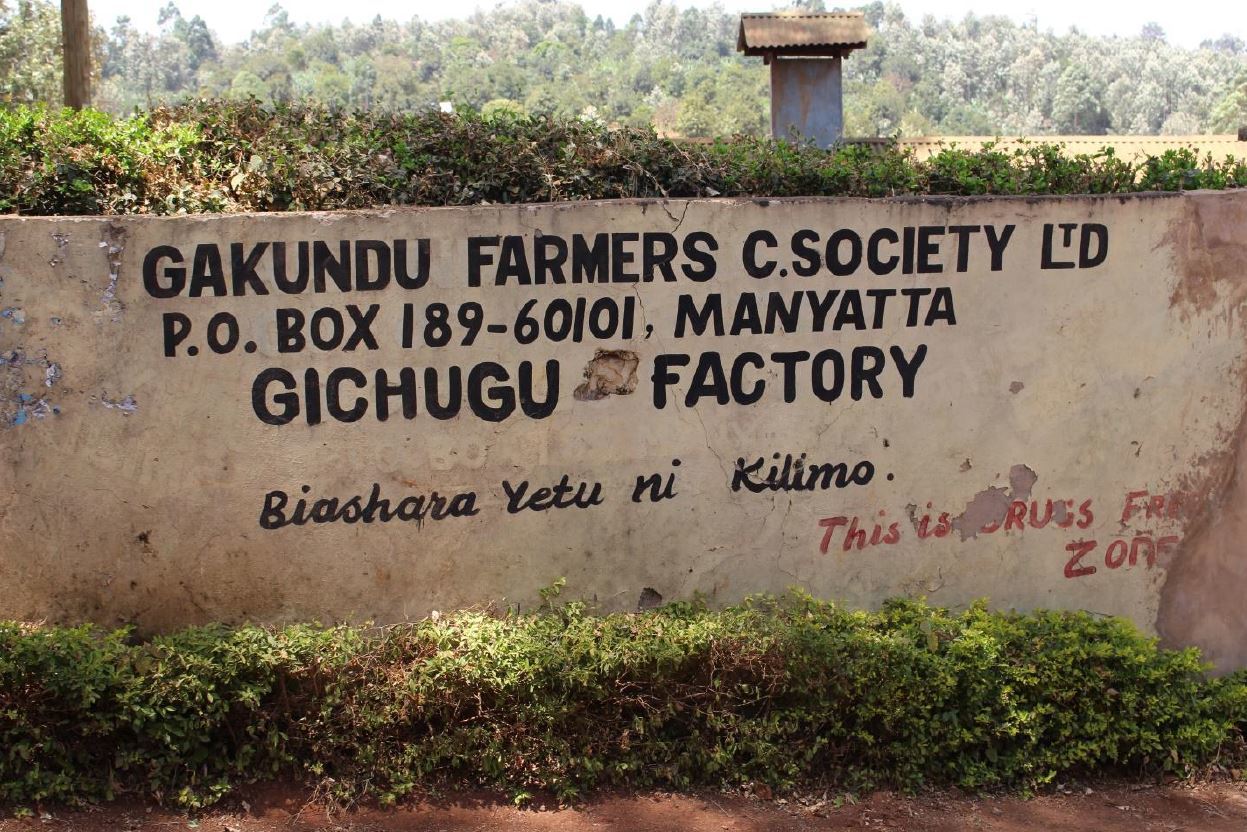
Once it arrives at the factory, the coffee cherries are processed to remove the skin and pulp – known as the wet processing method.
The factory is using a disc pulper with three sets of discs to remove the skin and fruit from the inner parchment layer that is protecting the green coffee bean. After pulping, the coffee is fermented overnight to break down the sugars, before it is cleaned, soaked and spread out on the raised drying tables. Time on the drying tables depends on climate, ambient temperature and volumes under processing, and can take from 7 to 15 days in total.
Waste water from processing is passed through nappier grass and trees which have been planted nearby to help in purifying the waste water.
The factory is receiving assistance from our partner Coffee Management Services (CMS). The long term goal is to increase coffee production through farmer training, input access, Good Agricultural Practice seminars, and a sustainable farming handbook updated and distributed annually. Together with CMS, we aim to establish a transparent, trust based relationship with the farmer, helping to support a sustained industry growth in Kenya, bringing premium quality to you, and premium prices to the farmers.
Through the pre-financing they receive, farmers are given advances for school fees and farm inputs. The factory manager is re-trained every year by CMS, in addition to field days being held by the minister of agriculture and agrochemical companies that deliver inputs to the farmers. Demonstration plots are planted at the factory to reinforce the best practices taught throughout the year.
What is SL28?
This coffee is the SL28 varietal, which is quite common to see on farms in Kenya. It’s been present in our past Brew Crew coffees from Kenya, though it’s not often that it’s been in a harvest without other varietals also being included too.
The SL stands for Scott Labs, who were commissioned in the 1930s by the Kenyan government to survey and catalog all the different varietals that existed in Kenya to find the ones best suited to commercial farming. In particular, the government was looking for a coffee varietal that showed strong resistance to drought and produced a high yield of coffee cherries.
The two strains that were selected were SL-34 and SL-28.
The SL-28 didn’t turn out to have particularly high yield, but what it does bring is big, complex delicious flavours.
Serious Eats has more on the story of this varietal.
The photo accompanying this coffee is from flickr/datakid23
Sourcing and ingredients
100% SL28, SL34 coffee beans, provided by Dormans and roasted by us on Gadigal land / Sydney.
Country grade: Unknown ?
Packaging
Bag: ABA Certified home compostable
Label: Recyclable
Valve (on bags larger than 250g): General waste
Coffee ordered online is shipped in a recyclable cardboard box
Brewing this coffee
We recommend brewing this coffee 15–49 days post-roast. If pre-ground, brew as soon as possible. Our advice on storing coffee.
1:3
dose:yield
ratio
To brew on espresso, we recommend using 20g of beans (dose) to get 60g of espresso out (yield), during 24-28 seconds.
1:16.7
beans:water
ratio
To brew in infusion/fed brewers (V60, Chemex) use a ratio of 1:16.7 ratio of beans:water.
1:14.3
beans:water
ratio
To brew in immersion brewers (plunger, AeroPress, Kalita, batch brewer) we recommend using a 1:14.3 ratio of beans:water
1:12
beans:water
ratio
To brew as cold brew we recommend using a 1:12 ratio of beans:water
Varietals
SL28 varietal
SL28 was developed in 1931 by Scott Laboratories to suit the growing conditions in Kenya. The varietal is known for its exceptional cup quality
SL34 varietal
Developed by Scott Laboratories in Kenya, the SL34 varietal was designed to be high yielding with good cup quality.
The location
Coffee from Kenya
Alongside Ethiopia and Colombia, Kenya is one of the origins we get most excited about at the roastery. It exports some of the most vibrant, bright, and unique coffees in the world.
The Embu region of Kenya
Named after the town of Embu, also near Mount Kenya and its fertile growing conditions
Farm processes
Washed process
Machines are used to remove the flesh from the coffee cherry before being fermented in water, washed again, and finally sun dried. This process tends to result in more distinct, cleaner flavours.

Subscribe to a world of coffee
Discover a new single origin coffee from Sample every 1-5 weeks with no delivery fees.
No up-front purchase, and you can pause, cancel, or change plans at any time.
Available to order online this week:
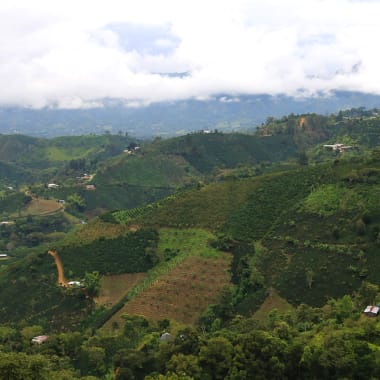
Colombia La Serrania Decaf
Flavours of honey and blackberry
Body Acidity
Washed + EA Natural Decaf Caturra, Castillo, V.Colombia
Roasted omni for filter and espresso
Colombia La Serrania Decaf online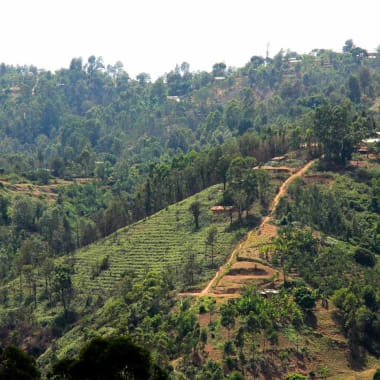
Kenya Gathaithi
Flavours of burnt toffee, orange, cola
Body Acidity
Washed SL-28, SL-34, Ruiru 11, Batian
November 2023 harvest
Roasted omni for filter and espresso
Kenya Gathaithi online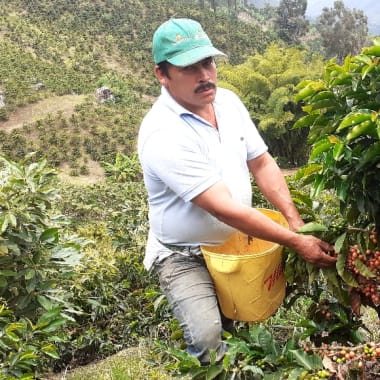
Colombia Faver Emir Ninco
Flavours of cola, cherry, blood orange
Body Acidity
Washed Pink Bourbon
March 2024 harvest
Roasted omni for filter and espresso
Colombia Faver Emir Ninco online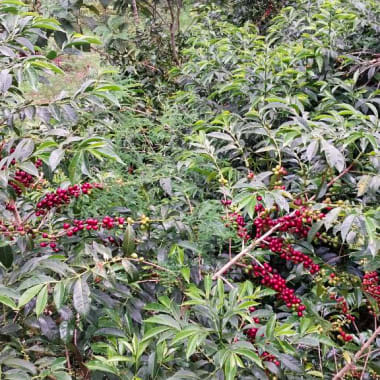
Ethiopia Bekele Gemeda
Flavours of orange marmalade, peach, apricot
Body Acidity
Washed Ethiopian Heirloom
January 2024 harvest
Roasted omni for filter and espresso
Ethiopia Bekele Gemeda online